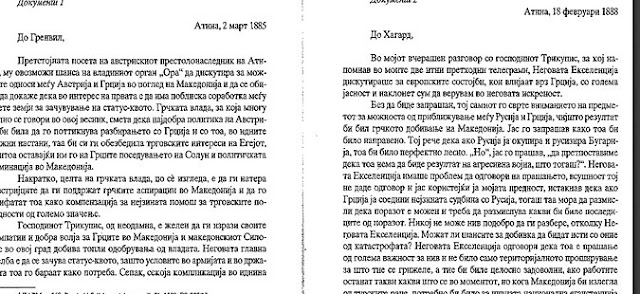British documents about Greece's aspirations in Macedonia
The first one refers to an article published in the progovernment newspaper “Ora”, which reflect the views of the government, led by Trikoupis, immediately before the visit of the AustroHungarian crown prince of Athens in March 1885. Greece wanted to win over Wien’s support in order to get Thessaloniki in exchange for Greek guarantees about AustroHungary’s trading interests in the Aegean Sea. The second document, dating back to 1888, refers to the possibility of an alliance between Greece and Russia and an agreement between the two countries that would help Greece conquer Macedonia.
Territorial pretensions
Dr. Dalibor Jovanovski, professor of history at the Faculty of Philosophy at the University of “Ss. Cyril and Methodius” in Skopje, says that after Thessaly became part of Greece in 1881, it began to border with Macedonia, one of the richest Ottoman regions resourcewise, and to which Athens had expressed territorial pretensions.
“It gave Greece the opportunity for an even stronger economical penetration, as well as political and cultural propaganda in Macedonia. It was aided by the Constantinople Patriarchy. Greece had expressed interest in Macedonia even before that, during the great eastern crisis, and had propaganda activities in and revolving around Macedonia. It has to be taken into consideration that the Greek government had greater interest in Crete at the time, where the chances of success were bigger because the nationalities of the island were better suited to the Greek aspirations, but also because none of the other Balkan countries had expressed such interest. That certainly wasn’t a reason for Greece to stop its activities in Macedonia altogether” – says Professor Dr. Dalibor Jovanovski.
According to him, when speaking about Greece’s plans and aspirations for Macedonia, we should also consider the fact that Greece, on its own, couldn’t have succeeded in its plans for several reasons.
A great European force also had an interest in Macedonia – AustroHungary.
“The Greek government was well aware that the great forces would not allow a change in the statusquo situation, achieved by the agreement at the Berlin Congress in 1878. Therefore, Greece realized its best chance at succeeding in its aspirations was by joining forces with one or several of the big European countries. The two British documents prove that” – the professor says.
Winning over Austro-Hungary
“The article said that it was in Wien’s interest to support Athens in its efforts to get Thessaloniki in exchange for Greek guarantees regarding AustroHungary’s trading interests in the Aegean Sea. The timing of the article was intentional as Greece had been trying to establish closer relations with Wien since 1883 in order to receive AustroHungary’s support in its interests, particularly Macedonia. Even though Greece presented its persistence as an effort to solve the Slavic threat to Greece and AustroHungary’s interests, the real reason was the fear that the Danube Monarchy might have a direct access at the Aegean Sea through Thessaloniki. Such a scenario would pose a great threat to the Greek interest and the faith of Hellenism in general” – the historian says.
He says Greece’s desire for Thessaloniki was best described by the British Ambassador in Athens,
Nicholson, that Trikoupis had based the entire future of Greece on the acquisition of Thessaloniki.
Possibility for Greek-Russian alliance in order to acquire Macedonia
The second document, dating back to 1888, refers to the possibility of an alliance between Greece and Russia and an agreement between the two countries that would help Greece conquer Macedonia.
“Prime Minister Trikoupis hinted at that possibility in his conversation with the British Ambassador in Athens. However, there are question marks about what triggered such a possibility, whether it was realistic and whether the Greeks believed in it. The change of direction in the Bulgarian foreign policy had Russia in an unenviable position. Aside from Montenegro, Petrograd’s influence in the other Balkan Christian countries had diminished. The convention from 1881 left Serbia under the influence of Wien, Sofia turned to the West, while Russian influence in Greece had been at the lowest point for years. However Russia saw its opportunity in the fact that Greece was not pleased with the results of the Bulgarian unification and the fact that Athens was not compensated, as well as the opinion of the Greek government that its main partner, England, was shifting its focus towards Bulgaria. This was where Russia stepped in and promised Greece to support its aspirations” – says the professor.
He thinks that the possibility had existed since early 1887, when Russia first announced its intention to support the Greek interests, even though nothing was official. In early 1888, the Russian diplomacy tested the waters by announcing its alleged desire to support Greece’s aspirations in Southern Macedonia, with some even claiming that this was completely true and that the Russian Consul in Thessaloniki received instruction in that direction. Such a position of the Russian diplomacy, honest or not, was something the Greek Prime Minister Trikoupis was familiar with. He used it as a bargaining chip to affirm Greece’s position and intention to acquire Thessaloniki with Russia’s support. He did however, emphasize that it was the only way for Greece as its interests were jeopardized by AustroHungary and because of the possibility that Thessaloniki, as well as the entire Macedonia, could fall under Slavic authority. That would leave the Greeks outnumbered and they would not have received help from England” – the professor explains.
“It later report by the British Ambassador in Athens confirmed it” – says professor Jovanovski.
Supported by the big forces, Serbia, Bulgaria and Greece eventually succeeded in their territorial pretentions in Macedonia with the Bucharest Agreement in 1913.







